This project is made possible through the partnership of WATER CHARITY and the NATIONAL PEACE CORPS ASSOCIATION. ![]()
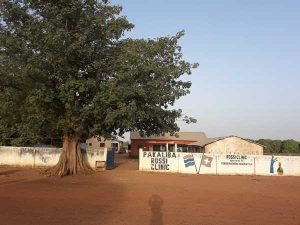 This project has been completed. To read about the conclusion, CLICK HERE.
This project has been completed. To read about the conclusion, CLICK HERE.
Location
Pakali Ba Village, Jarra Central Province, Central River District, The Gambia
Community Description
Pakali Ba is a rural farming community of approximately 1,300 people, remote from the populated areas of The Gambia which are nearer the Atlantic Coast.
The Minor Health Center, run by the Gambian Government, serves more than 30 villages in the surrounding area, plus up to ten villages across the Senegalese border in Casamance.
The clinic sees 800-1,000 patient visits per month, which includes its well-child and prenatal clinics. In recent years the clinic averages 90-100 births per year, but for some unknown reason, deliveries increased to 141 in 2017.
Staff includes 2 midwives, 2 nurses, 1 public health officer, 2 orderlies, a nurse attendant (assistant), a groundskeeper, a laundress, and a driver for the ambulance. Nurses are paid approximately $45 a month and generally serve far from their homes and families. The ambulance is used sparingly as it is not fuel-efficient and the government allowance for fuel is very limited.
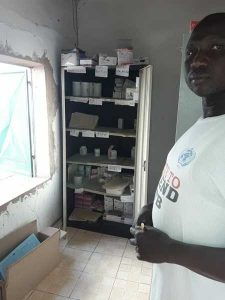 Problem Addressed
Problem Addressed
The clinic has one water standpipe supplied by the local community. However, the water supply is intermittent. There are often days in a row when there is no water supply at all. There are no hand-washing, shower or toilet facilities in the clinic buildings or staff quarters. Pakali Ba Health Center needs a full, reliable water supply.
In addition, the staff quarters are inadequate, requiring two of the staff to live somewhat precariously off-site. A two-room extension of the existing quarters has been constructed but remains unfinished since the government is not supplying the needed funds and there is no other sponsorship. The quarters need concrete flooring, timber-and-cardboard ceiling, metal windows, and doors. There is an unfinished septic tank outside the rooms, which when finished would provide toilet facilities.
Project Description
This project includes a hand-dug, concrete-lined well with a submersible 24-volt solar-powered water pump. Either a single 24-volt solar panel or two 150-watt, 12-volt panels wired in series will power the pump.
Storage will be a double-walled, plastic, 2,000-liter water tank on a 5-meter, concrete tower.
Plumbing will be run into the clinic buildings as well as the staff quarters to provide hand-washing, toilet and shower facilities.
The community will provide unskilled labor and local materials.
Project Impact
Pakali Ba Minor Health Center sees approximately 12,000 patient visits per year.
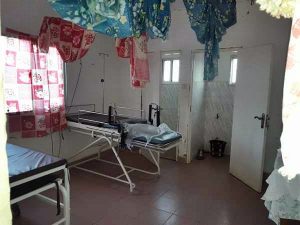 Project Administrator
Project Administrator
Mike McConnell, Managing Trustee, GambiaRising, and Former Country Director for Peace Corps in The Gambia from 2007 through 2009. Mike previously directed several projects working with Water Charity
Monitoring and Maintenance
The team, consisting of Abubacarr Jobe, Chief Nurse, Fanta Bojang, RN, and Ebrima Marong, GambiaRising WAME program coordinator, will manage the project and also monitor the system after completion.
Let Girls Learn
The clinic sees 800-1,000 patient visits per month, which includes its well-child and prenatal clinics. In recent years the clinic averages 90-100 births per year. Healthy children (and healthy mothers) are a precondition for girls learning!
Project Funding
This project has been made possible through the generosity of an anonymous donor.
This project is part of our ongoing Western Africa Water & Sanitation Program, and donations using the Donate button below will be allocated to projects in that program.
Funds raised in excess of the project amount will be allocated to other projects in the country.
Conclusion of Pakali Ba Health Center Well Project – The Gambia
This project has been completed under the direction of Mike McConnell, Managing Trustee, GambiaRising, and former Country Director for Peace Corps in The Gambia, and Emily Lundberg, PhD., Head of the Working Water program at GambiaRising. To read about the start of the project, CLICK HERE.
The project was designed to build a hand-dug, concrete-lined well with a submersible solar-powered water pump.
Emily reports:
LOCATION: Pakali Ba Village, Jarra Central Province, Central River District, the Gambia
 This family rode in a horse cart about 12 kilometers from their village in Cassamance, Senegal, for their children’s immunizations at the now fully-plumbed Pakali Ba Health Center.)
This family rode in a horse cart about 12 kilometers from their village in Cassamance, Senegal, for their children’s immunizations at the now fully-plumbed Pakali Ba Health Center.)
Over a period of several weeks, WAME and Gambia Rising’s Working Water team, with funding from Water Charity, have successfully completed the Pakali Ba Health Center project. The project was completed with hard work and great results. The clinic and community could not be more delighted with their working water system.
The clinic serves more than 30 villages in the surrounding area, seeing approximately 12,000 patients per year. The clinic had been without an adequate water supply for years. There was only one intermittently working standpipe supplied by the local community and shared with the clinic. There were often days in a row with no water at all. There were no hand-washing, shower or toilet facilities in the clinic buildings or in the staff quarters. Patients and staff were demoralized. Needless to say, the clinic needed water.
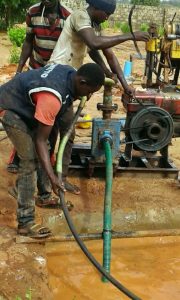
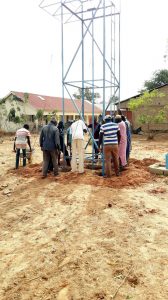
Our team led by Ebrima Marong of WAME (West Africa Medicine and Education) oversaw the digging of the borehole to the required 17 meters using a 4.5-inch drill bit. The mud and unwanted water were pumped out before clean water was reached. Space was then created for the well’s solid fill concrete lining. The borehole was encased in concrete to the last half a century.
A high-quality submersible solar pump was inserted into the well and a 2,000-liter double-coated water storage tank was mounted with a solar panel on a solid iron frame of 6 meters’ in height. The community helped to unload and assemble the tower. Here the community is helping erect the tower.
The unfinished staff quarters were plastered and the roofing was completed. Piping was laid within the health center, providing water to the labor ward, public health section, outpatient ward, inpatient ward, reproductive and child health ward, laboratory, staff quarters and other areas within the health center. Six bathrooms were completed, 8 complete toilets, 4 wash hand basins, 8 taps, and 3 standpipes. The clinic had been without a laboratory. Now, with a small laboratory fully equipped with fresh running water, the clinic can easily and safely conduct tests such as RDT Malaria, urinalysis, HB/BF, blood sugar tests, and so on.
After the project was completed, the Chief Nurse of the hospital Buba Jobe thanked the team and said, “The importance of water supply in this facility cannot be over-emphasized. The staff has had to travel quite a distance just to find water to even wash their hands. Now we will find it easy to wash our hands before and after every medical procedure.” The Deputy Officer of the Health Ministry said, “Water is essential for a health center. It helps us prevent infection and the transmission of diseases. The whole community and also we are very happy with the help of WAME and Water Charity.”
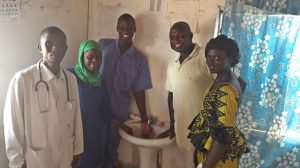
The community was very active in doing all the related labor. They stood vigilant watching over the entire project, making sure it made it through to successful completion. The entire community came together to celebrate the project’s completion. The clinic staff were extremely helpful throughout the entire process and were delighted with the results.
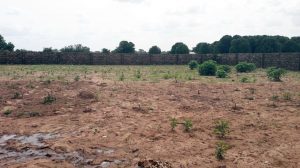
There was an empty piece of land within the clinic’s compound. We provided a standpipe to enable the staff to grow cassava, beans and other vegetables. to supplement their food needs. The clinic quickly planted and watered their new garden.
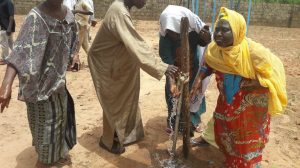
Notable community figures, elders, traditional singers, and women cultural groups gathered for a commemoration ceremony that included a tour and concluded with appreciation expressed through singing, dancing, and cracking jokes by griots or ‘’kanyelengos’’ (traditional women communicators) as a form of appreciation.
We would like to thank Water Charity for making this project happen. And we would like to emphasize that great effort was expended making sure that quality was obtained in purchasing and that the funds were spent wisely. Funding for projects such as this is critical, and we do not take it lightly.
Here’s a short 2-minute video recap of the project:
Here’s an 8-minute series of vignettes taken as the project progressed:
We extend our thanks to Mike and Emily for completing this important project.